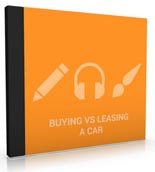
 License Type: Personal Use
License Type: Personal Use  File Type: ZIP
File Type: ZIP
 SKU: 62201
SKU: 62201  Shipping: Online Download
Shipping: Online Download
Sample Content Preview
The Benefits of Leasing a Car
The fast-paced challenge of new technology is everywhere. Computers are geared to last three years, maybe less. Smartphones barely last a year before new tech-nology and new uses have made them obsolete and in need of replacement.
What about the most complex arrangement of mechanical and electronic engi-neering most of us are ever likely to own: the automobile? That single umbrella word “car” takes in a vast amount of computer and electronics, much of which is improved and updated on a daily basis. With so much change coming so fast, it makes perfect sense to lease a car, instead of buying.
If you’re on the fence about leasing a car, consider this:
• Leasing helps you stay current. Most people are not able to buy a new car as often as, say a cell phone. That’s where leasing comes in. When you lease a car, you’re never saddled with old technology. You actually can change out cars as you need to, ensuring that you have the latest in comfort and fuel economy.
• Lower monthly payments. When you buy a car, you’re buying the life of the car. That is to say, a car you purchase for $20,000.00 is worth $20,000 at the time of purchase but may have no value at the end of 15 or 20 years when the life cycle of the car is complete. When leasing, you’re paying for the portion of the car’s lifecycle you’re actually going to use. A $20,000 car today might be only worth $12,000 in three years. With leasing, you’re only paying on that $8,000 (plus interest) that you’re actually using of that car’s life cycle.
• The never-ending warranty. If the car is always under warranty, you don’t have to worry about costly repairs other than normal wear and tear on the car. You simply say, “fix it” and it’s all completed for you, and with few exceptions, it’s all covered.
• Taxes. If you’re not buying a car, you’re not usually going to pay sales tax, though you need to check the regulations in your state. If there is sales tax, it’s only for the amount of the car’s life you’re buying. So, on that earlier example, you’re only paying sales tax on the $8,000 you spent on the car, vs. sales tax on the full $20,000
• Selling/Trading in. Many people feel overwhelmed by the process of selling a car or getting a good price as a trade-in. Leasing solves that issue, simply re-turn the car and walk away. Or better yet, drive away in a new lease.
While leasing might not be the one-size-fits-all solution, there are many ad-vantages to leasing a car. The greater freedom and the ability to keep up with cur-rent technology makes leasing an attractive option.
The Biggest Financial Mistakes People Make When Buying a Car
Buying a car is a big investment. But it's not only the price of the vehicle that needs to be considered. There are also interest rates and monthly payments, spread out over how long the loan is for to take into consideration.
There are several pitfalls that are common to many car buyers. Be careful of these:
• Loan length. Dealerships will give you a startlingly good monthly payment if you extend the loan to 60 or 70 months. This is a bad mistake. Why do they do it? Two reasons: they want to sell you the car. If you can see that the monthly financing is in your budget, you’ll be more likely to go for it. The other reason? They don’t want to sell you that car. They want to sell you a much more expen-sive car, one where monthly payments in a 70-month plan are affordable.
Why not? As soon as a car is sold, it depreciates rapidly. A car is – finan-cially speaking, a bad investment. It is, in fact, a losing investment. The other side to a longer lease is more payments on interest. Eventually, you’ll end up paying twice the original value of the car and will never re-cover what you owe when you sell it.
Solution? Don’t get a car you can’t pay off in three years. It might not be as slick as the nicer ones, but your finances will love you.
• Leasing. Keep in mind that cars are financially a bad idea. They depreciate. Fast. On the other hand, if you pay off a car in three years and drive it for five after that, you can take that money you’ve been using for car payments and put to other use. At the end of three years on a lease, all you have is someone else’s car who wants it back. Now you have to start on a new lease.
Why not? No one needs a new car every three years, and if you are run-ning a car so hard that you do, then the leasing company is going to fine you heavily for excess wear and tear. When you’re done, you’ll have no car, no trade-in and no way to get another car except through another lease.
Solution? No one ever improved their credit by leasing. But a purchase with prompt payments will go a long way to revitalizing your credit and give you a credible option for other uses of your money.
Don’t let these mistakes affect your happiness with purchasing your car. With a little proper care and research, you’ll be able to avoid them, and still, have good financial footing alongside a beautiful and dependable vehicle.
The Downside of Buying a Car
Owning a shiny new car is a dream most of us have had at one point. Chances are, our fantasies date back to our childhood when we saw that bright red sports car reflecting the sunlight as it flew by. From that moment, on we’ve all given a thought to owning a car. It’s been a part of the “American Dream” for genera-tions.
But there are some problems with achieving that dream that needs to be consid-ered in the cold light of day. Here are a few things to think about when consider-ing whether to buy a car.
- License: Personal Use
- Category:Ebooks
- Tags:2018 Ebooks With Audio Personal Use







